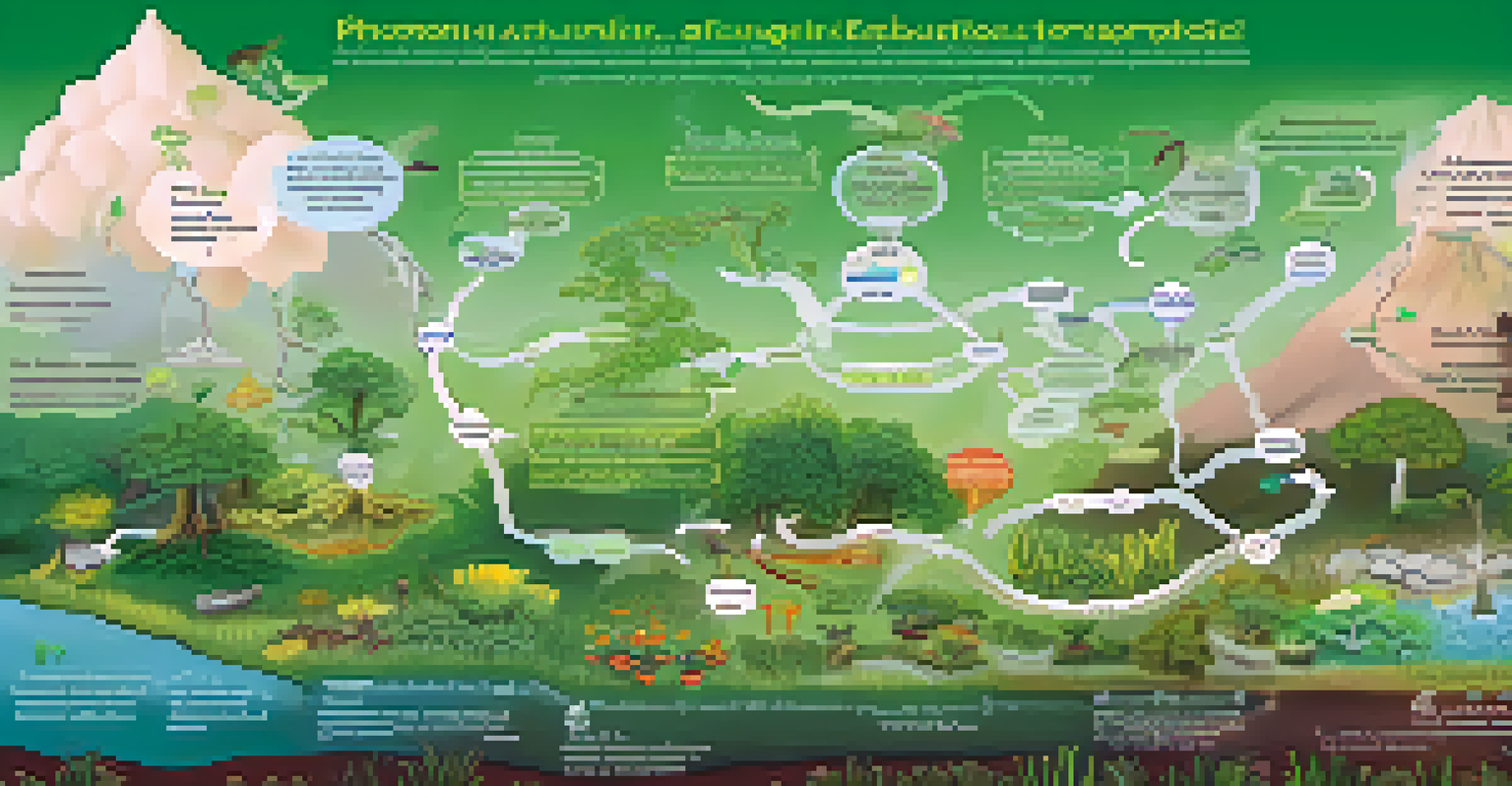The Role of Fungi in Nutrient Cycling for Plant Productivity

Understanding Nutrient Cycling in Ecosystems
Nutrient cycling is a natural process where nutrients are reused in ecosystems, ensuring a continuous supply for plants. This cycle involves various organisms, but fungi play a particularly crucial role. By breaking down organic matter, fungi release essential nutrients such as nitrogen and phosphorus, making them available for plant uptake.
The health of soil is directly linked to the health of the ecosystem, and fungi play a crucial role in maintaining that balance.
Think of nutrient cycling as a relay race—each organism passes the baton of nutrients along, with fungi often being the first to break down complex materials. This decomposition process not only enriches the soil but also improves its structure, allowing for better water retention. Plants thrive in this environment, showcasing the interconnectedness of life in our ecosystems.
In summary, understanding nutrient cycling helps us appreciate the vital role fungi play in supporting plant life. It's a fascinating process that illustrates the delicate balance of nature and the importance of every organism, big or small.
Fungi as Decomposers: The Breakdown Process
Fungi are nature’s decomposers, breaking down dead organic matter into simpler substances. This decomposition process is essential for returning nutrients to the soil, which plants need to grow. Without fungi, organic waste would accumulate, and nutrient availability would diminish, leading to poorer plant health.

Imagine fungi as the cleanup crew in a busy kitchen—without them, leftover food would pile up and create chaos. Similarly, fungi help maintain ecological balance by ensuring that nutrients are recycled efficiently. They break down complex organic compounds like cellulose and lignin, which many other organisms cannot digest.
Fungi Enhance Nutrient Cycling
Fungi play a crucial role in breaking down organic matter, returning essential nutrients to the soil for plant uptake.
Through this breakdown process, fungi release vital nutrients back into the soil, transforming it into a fertile ground for plants. Their ability to decompose not only supports plant growth but also contributes to soil health and ecosystem stability.
Mycorrhizal Fungi: A Plant's Best Friend
Mycorrhizal fungi form symbiotic relationships with plant roots, enhancing nutrient absorption. In this partnership, fungi extend their hyphae (thread-like structures) into the soil, increasing the surface area for nutrient uptake. This means plants can access more phosphorus, nitrogen, and other essential nutrients than they could on their own.
Nature is a vast intricacy of interdependence; fungi are the hidden networks that sustain life.
Think of mycorrhizal fungi as a helpful friend who knows where to find the best resources. Just as a friend might share their snacks with you, these fungi share the nutrients they gather from the soil with the plants. This mutualistic relationship benefits both parties—plants provide carbohydrates to the fungi in return.
Research has shown that plants associated with mycorrhizal fungi often exhibit improved growth and resilience to stress. This relationship is crucial, especially in nutrient-poor soils, showcasing how fungi directly contribute to plant productivity.
Fungi and the Nitrogen Cycle: A Vital Connection
Fungi play an essential role in the nitrogen cycle, which is vital for plant growth. They help convert atmospheric nitrogen into forms that plants can absorb, a process known as nitrogen fixation. This is particularly important in ecosystems where nitrogen availability is limited.
Similar to how a skilled chef transforms raw ingredients into a delicious dish, fungi transform nitrogen into usable forms for plants. This process not only boosts plant productivity but also enhances soil fertility. By facilitating nitrogen cycling, fungi ensure that plants have the necessary nutrients to thrive.
Mycorrhizal Fungi Boost Plant Growth
Mycorrhizal fungi form beneficial relationships with plants, enhancing nutrient absorption and overall plant health.
In essence, the relationship between fungi and the nitrogen cycle highlights the importance of these organisms in maintaining healthy ecosystems. Their contribution allows for more robust plant growth, which is crucial for agriculture and natural vegetation alike.
Fungi's Role in Carbon Cycling and Soil Health
Fungi are integral to carbon cycling, breaking down organic matter and releasing carbon back into the soil. This process not only helps sequester carbon but also improves overall soil health. Healthy soils, enriched with organic matter, are essential for robust plant growth and sustainability.
Imagine a sponge soaking up water; healthy soils act similarly by retaining moisture and nutrients. Fungi help create this sponge-like effect by decomposing organic materials, which enhances soil structure and fertility. As they break down carbon-rich substances, they also promote the formation of stable organic matter.
The relationship between fungi and carbon cycling underscores the importance of soil health for plant productivity. By supporting this cycle, fungi contribute to a thriving ecosystem that benefits both flora and fauna.
Impact of Fungi on Plant Diversity and Resilience
The presence of fungi in ecosystems significantly influences plant diversity and resilience. By facilitating nutrient availability and improving soil health, fungi create a favorable environment for various plant species. This diversity, in turn, enhances ecosystem stability and resilience against environmental changes.
Consider a diverse garden filled with different flowers and plants—each one contributes to the overall beauty and balance of the space. Similarly, diverse plant communities supported by fungi can withstand pests, diseases, and climate fluctuations more effectively. Fungi help ensure that every plant has access to the nutrients it needs to flourish.
Fungi Support Ecosystem Diversity
The presence of fungi in ecosystems promotes plant diversity and resilience, contributing to a stable and balanced environment.
Ultimately, the interplay between fungi and plant diversity highlights the intricate connections within ecosystems. Fungi not only support individual plants but also contribute to a balanced and resilient community of life.
Challenges Facing Fungi and Their Ecological Role
Despite their critical role, fungi face numerous challenges, including habitat loss and climate change. These factors can disrupt their life cycles and reduce their populations, ultimately impacting nutrient cycling and plant productivity. Protecting fungal habitats is essential for maintaining healthy ecosystems.
Think of fungi as the unsung heroes of our environment; they often go unnoticed until their absence is felt. Just as the loss of a keystone species can destabilize an ecosystem, the decline of fungal populations can have cascading effects on nutrient availability and plant health. It's crucial to recognize and address these challenges to ensure the survival of fungi.

By understanding the pressures fungi face, we can take steps to preserve their habitats and promote biodiversity. Supporting fungi is not just about protecting a single group of organisms—it's about safeguarding the entire ecosystem's health and function.
Promoting Fungal Health for Sustainable Agriculture
Encouraging healthy fungal populations is vital for sustainable agriculture and plant productivity. Practices like crop rotation, reduced tillage, and organic farming can help maintain and enhance fungal biodiversity in the soil. These practices not only support fungi but also promote overall soil health.
Imagine tending to a garden where the soil is rich and alive with beneficial organisms. By nurturing the soil and minimizing chemical inputs, farmers can create an environment where fungi thrive. This, in turn, leads to healthier plants and more sustainable farming practices.
In summary, promoting fungal health is a win-win situation for both farmers and the environment. By investing in sustainable practices that support fungi, we can ensure a productive and resilient agricultural system for future generations.